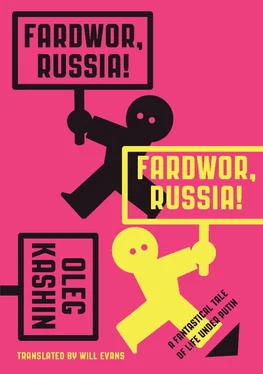“Hey, what’s with you, go on,” Karpov gently nudged her in the back, and Marina suddenly realized how nervous he was. “Go ahead,” he repeated. “We’re here.”
She knew without being told that they had arrived, though the very idea of this trip still bothered her. If someone asked Marina if she knew why they had come here, she would answer without hesitation that she did not, but this would be only half the problem; after all, a wife is not required to understand everything that her husband does, sometimes it’s enough to simply trust him. What bothered her more was that he himself apparently didn’t understand why they’d had to give up everything in Moscow, quit their jobs, empty out their apartment, palm off their excess books and things on their friends and fly to this strange land they didn’t (not even Karpov) fully understand. Karpov’s anxiety frightened and upset Marina; during the flight she had almost managed to convince herself that all of her worries most likely stemmed from insecurity, whereas all that was happening was that a new life was beginning, one that was interesting but still happy like before. As for his nighttime laboratory experiments, well, they weren’t exactly in a laboratory, but in the kitchen—and who the hell knows what kind of experiments they are anyway—but she always considered them a harmless hobby and of course was surprised when he suddenly told her that this hobby required sacrifices from them, like necessitating them, at the very least, to move to another city. There was nothing keeping them in Moscow, and Karpov was so convincing and, more importantly, so committed to the idea, that it didn’t even occur to her to object, and she immediately agreed: yes, of course if you think so then we have to go. And although everything after that point took longer than they might have expected, they both still had plenty of time to think it over and argue about it; but for whatever reason she didn’t think it over or argue, and when he told her that he had bought tickets for the twenty-eighth, she merely shrugged her shoulders—fine, the twenty-eighth, what difference does it make?
On their way to the taxi stand at this airport, he said that it probably wasn’t worth the effort to head into the town now; there wouldn’t be anywhere to eat dinner there and in general he didn’t know if there was much of anything there at all, so it was better to spend the night in a hotel, to have dinner and breakfast in the city and to continue on to the town the next day after a good night’s sleep, well-fed. For whatever reason this immediately calmed her down; if he could think about food and comfort it meant that he still had it together and could still be trusted. Having arrived at this conclusion, Marina kissed her husband silently on the cheek; Karpov flinched, and she smiled: after all these years together, he still couldn’t get used to the fact that she was in constant conversation with him, even when she was silent.
They didn’t bother to haggle with the taxi driver; the three hundred rubles that he wanted was perfectly acceptable. Marina got into the back, Karpov sat next to the driver, the taxi passed through a dark alley, and after a minute or so, Marina saw an illuminated crossroads bounded by a line of trees, and through the darkness behind them she could see a cemetery with crosses.
“My grandfather is buried here, and my grandmother and great-grandmother,” Karpov said, and Marina for some reason thought that she was really sleepy but Karpov was still anxious, and whenever he got like this, he would always start telling stories, like now; and sure enough he started in on something about his grandfather to her or to the taxi driver, although most likely to her. She didn’t really feel like listening, and just sat there smoking, smiling, and looking out the car windows at the hills interspersed with lines of trees.
She had never been in the Russian South and in general knew very little about these lands (or, in fact, about the rest of Russia either), which was typical of what seemed like every Muscovite girl from a cultured family—she had been to America, and Europe, and though she hadn’t yet made it to Goa, most likely she’d get there someday; but the fate of those Russians beyond Moscow’s outer beltway had passed her by; jokes about provincials and local idiots and their kind were totally foreign to her, and Karpov, though he didn’t let on that he was always offended when someone would point out the inferiority of rural newcomers to the city, valued this trait in Marina too. Marina thought that he pretty much valued all of her qualities, and she smiled again.
In the meantime, the city started to appear on the hills, and Marina looked with curiosity at the fences painted in an identical blue color and the similar small one-story stone houses with rustic carved wooden trim around the windows—imitations of rural huts in unforested areas. Occasionally vacant lots appeared between the houses, and then Marina could again see the hills, now with no trees, but rather with the same kind of little houses huddling together on the hills as if Russia, even with its enormous expanses, somehow had less living space than a country like, say, crowded, tiny Holland. Then the empty spaces ended, the houses became two-storied; then there was a factory of some sort, then a round Soviet-era building, apparently a circus, and a boulevard that began after the circus. They drove down the boulevard and Karpov, gesticulating, explained something to the taxi driver. Marina liked how Karpov was able to explain things, but right now she didn’t really want to figure out what he was talking about. Marina hoped that he knew what he was doing; “hoped” was the word for it. Up to now Karpov’s only argument in favor of moving out here from Moscow was that within a year he would become rich and famous, and if he didn’t, then Marina had every right to leave him, get a divorce, and forget that he had ever existed. But even if this option appealed to her, she shouldn’t get her hopes up, because the chance of Karpov achieving fame and fortune were one hundred percent, and after half a year she would be convinced of it.
He told her his plan in the winter, three months ago, when, having come to meet her after work, he suggested they take a walk. They stopped in a coffeehouse on Pokrovsky Boulevard to get out of the cold and warm up, and after listening to her perhaps too-detailed account of all that happened to her during the course of the day (she knew that she talked too much; she would laugh, like, you’ll never be able to get a word in edgewise with me—and he would laugh too, because he was always certain that his words meant to her exactly as much as he needed to be happy), suddenly, without preface or, as in his favorite expression, “any architectural extravagances,” he told her that they needed to move. Now she thought that this boulevard probably had some coffeehouses too, and Moscow seemed to no longer exist—and not even the fact that her parents remained in Moscow could convince her that earlier that same day she had been riding through Moscow from Taganka to Paveletskaya Station, where Karpov had been waiting for her with her carry-on suitcase by the ticket window for the trains to Domodedovo Airport.
Now this same suitcase was being taken out of the trunk and given to Karpov by the local taxi driver, obviously a Cossack, though this guy was nothing like some hero from And Quiet Flows the Don or any sort of exotic creature—he was simply a taxi driver, and that was it. For some reason Karpov had decided get out of the taxi here, several blocks from the hotel. He wanted to show Marina his favorite monument; at this point Marina could easily do without tourist excursions, but she didn’t have the strength to object. A monument’s a monument, after all. They walked across a wide, vast, empty space paved with enormous concrete slabs toward a precipice that offered a view of the same hills with stone huts she had seen before. At the edge of the precipice stood a gargantuan statue of a Red Army soldier in a pointed cap and trench coat; Marina had thought at first that it was made of bronze, and then realized that it was most likely a piece of tin junk. A huge foot protruded from under the overcoat (probably to keep the statue from tipping over), and behind him rose a bayonet resembling a gigantic antenna. The statue’s face was deformed and not very well-designed, and its arm poked unnaturally backward. Marina could have listed another dozen absurdities of the statue’s appearance, but the overall impression it produced in her was quite favorable and strong, and taking another look at the statue, Marina told Karpov (and Karpov was no longer just nervous but also noticeably embarrassed, as if he was waiting for her to tell him that she did not understand what he liked so much about this enormous piece of tin junk) that she agreed with him—this was a very, very beautiful statue indeed.
Читать дальше




![Stephan Orth - Behind Putin's Curtain - Friendships and Misadventures Inside Russia [aka Couchsurfing in Russia]](/books/415210/stephan-orth-behind-putin-s-curtain-friendships-a-thumb.webp)






